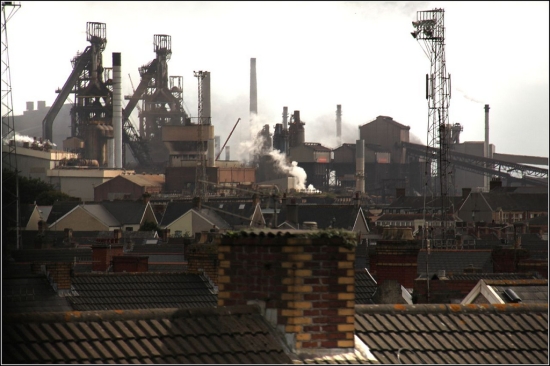The past few years have been difficult for many UK workers with businesses going into administration and job security becoming something of a thing of the past. Even now, with the recession over and businesses more able to begin investing in the future again, British workers are continuing to lose their jobs at an alarming rate – with the recent administration of electronics chain Comet adding to the casualties in the last week.
And it isn’t only the retail sector that is suffering. Last week, Tata Steel announced that 900 UK workers will be made redundant due to large scale cutbacks on a management level.
Most of the job losses will be in the south Wales with administrative and management positions in both Port Talbot and Llanwern sustaining the largest numbers of casualties. Additionally, smaller plants in Crosskeys, Caerphilly and Tredegar, Blaneau Gwent, will cease operations entirely.

Industry and housing side by side in Port Talbot
Elsewhere in the UK, the remaining 300 losses will be in Yorkshire, the West Midlands and Teesside. Furthermore, the company’s plants in Rotherham and Hartlepool will work on a reduced shift basis as a result of a lowering demand for pipelines and bar products – the primary items produced there.
While Tata, which currently employs around 19,000 workers in the UK, is making drastic cutbacks plans are in place to re-open a blast furnace in Port Talbot early next year. This is part of a £250 million investment scheme that has been designed in order to allow the UK business more versatility so it can cope with the challenging economic conditions in Europe right now.
According to the firm, demand for steel products in Europe is forecast to drop by 10 per cent this year, compounding the issue of a 25 per cent fall in demand since 2007. Yet by investing in long term stability, Tata Steel believes that it can prevent further job losses in the future.
Speaking of the upcoming 900 redundancies, general secretary of the Community trade union Michael Leahy says; “This announcement comes after a four year long downturn in the UK and European steel industry, where the fall in UK steel demand has been steeper than in any other major European economy.
“This is why we need faster investment in infrastructure programmes and community benefit clauses in UK procurement, just as France and Germany do to support their own manufacturing industry.”
Of course, the job losses will take a heavy toll on the communities based around the plants as many families are supported by the steel industry, especially in south Wales. Chief executive of Tata Steel’s European programmes, Karl Kohler, expressed his sympathies for the affected workers and maintained that the company would do all in its power to create jobs in the areas by investing heavily in UK operations.
He said; “Today’s proposals are part of a strategy to transform ourselves into an all-weather steel producer, capable of succeeding in difficult economic conditions.
“These restructuring proposals will help make our business more successful and sustainable, but the job losses are regrettable and I know this will be a difficult and unsettling time for the employees and the families affected.
“We will be working with our trade unions and government at a national and local level to ensure we provide them with as much assistance and support as possible. In addition, our subsidiary UK Steel Enterprise will be looking at how it can provide more support to local steel communities and stimulate new jobs following today’s announcement.”
Do you think that in situations such as this, the government should be stepping in to provide investment to ensure that the job losses are kept to a minimum? How could the UK boost demand for steel products so that communities are not damaged by sudden and large scale mass unemployment again?
Previous Post
Dagenham Seeks Science Hub Backing